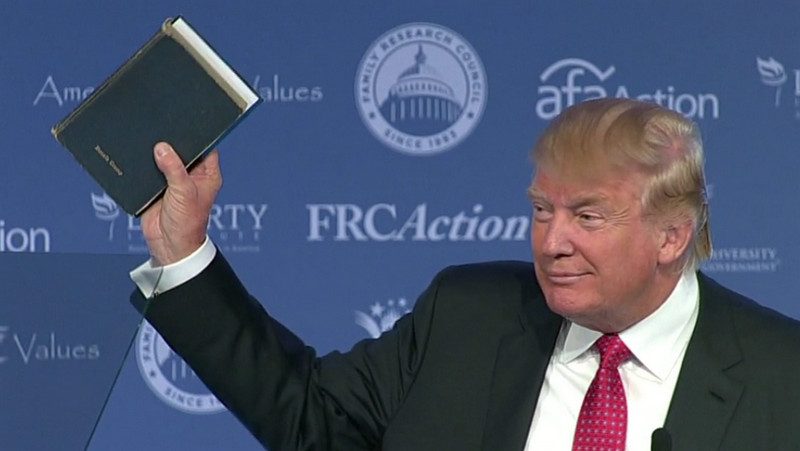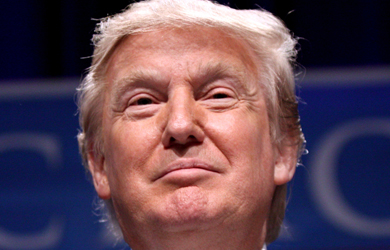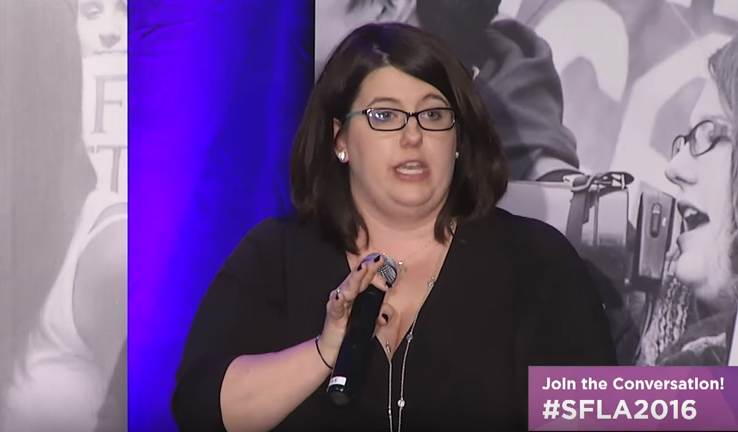President Trump’s first 100 days in office, judging by his own campaign promises, have been a disaster, with his administration bogged down by scandals, infighting, and ineptitude.
While Trump has now complained that the 100-day benchmark he set for himself is a “ridiculous standard” and insisted that his well-known policy failures are actually moving forward smoothly, he can take pleasure in knowing that he secured massive giveaways to polluters, came to the aid of Wall Street, and took credit for job-creation announcements that were first unveiled during Barack Obama’s time in office.
The president has also made serious progress in helping one constituency: The Religious Right.
During the campaign, Trump worked hard to ease fears among self-described “pro-family” leaders that despite his own history of bragging about sexually assaulting women; lewdly describing his daughters; publicly feuding with ex-wives; running casinos (including one that hosted a strip club), failed businesses and outright scams; elevating racist bigotry and misogyny; and mocking Jesus Christ as an egomaniac, he would do their bidding in return for their support.
Craving political power, Religious Right leaders obliged, aligning squarely behind Trump despite the fact that doing so exposed their “family values” posturing as nothing more than a sham.
While failing in a myriad of other ways, Trump has so far upheld his end of this bargain, making sure that the Religious Right gets whatever it wants. Here are just five ways that Trump has delivered on behalf of this extreme movement in his first 100 days:
1) Nominating A Right-Wing Justice To The Supreme Court
After Senate Republicans refused to consider Barack Obama’s nominee to the Supreme Court for nearly a year, conservatives got their wish when Trump announced that Judge Neil Gorsuch was his choice to replace the late Justice Antonin Scalia on the court.
Far-right activists immediately praised Trump’s pick and the leaders of groups such as the Federalist Society, Concerned Women for America, American Values, National Right to Life, and the Susan B. Anthony List met with the president following his announcement. They had reason to celebrate, as Trump had denounced the court’s Obergefell decision, which struck down state bans on marriage equality, and pledged to only nominate jurists who would uphold anti-abortion laws and overturn Roe v. Wade.
Trump credited the heads of the Federalist Society and the Heritage Foundation, Leonard Leo and Jim DeMint, respectively, for their deep involvement in the Supreme Court selection process. Indeed, the two ultraconservative groups, which came up with the two lists of potential nominees that Trump released during the campaign, are also set to influence the president’s selection of lower court nominees.
Delighted by his conservative record, right-wing groups are already eager to have Gorsuch begin to chip away at the separation of church and state and undercut abortion rights. The heads of the anti-choice groups Concerned Women for America and the Susan B. Anthony List met with Gorsuch following his swearing-in ceremony, and the National Organization for Marriage has even boasted that Gorsuch and future Trump nominees will help them overturn the court’s marriage equality decision.
2) Stacking The Administration With Far-Right Activists
The Religious Right was thrilled when Trump selected right-wing figures to lead government agencies, like Jeff Sessions as attorney general, Tom Price to head the Department of Health and Human Services, Ben Carson to lead the Department of Housing and Urban Development, and Betsy DeVos to run the Education Department. Sessions, Price, and Carson are longtime supporters of the Religious Right’s agenda, and DeVos and her family have been among the biggest funders of conservative causes. Trump’s choice for army secretary, unsurprisingly, also has an adamantly anti-LGBTQ record.
Beyond just the Cabinet picks, Trump has filled the government with conservative writers, activists, and lobbyists, and named Steve Bannon and Stephen Miller, who both hold far-right nationalist views, as his top advisers.
Ken Blackwell, an official with the Family Research Council who led the Trump transition team on domestic policy issues, said that Trump officials have “a great plan to attack the administrative state” and “unhinge” the “aggressive LGBT agenda” supported by the Obama administration.
Recently, the Trump administration announced that Roger Severino, an anti-LGBTQ activist who is the former director of the DeVos Center for Religion and Civil Society at the Heritage Foundation and legal counsel for the Becket Fund for Religious Liberty, will lead the Health and Human Services’ Office of Civil Rights, and that Candice Jackson, a critic of feminism who believes that white people are today’s victims of discrimination, will serve as the acting head of the Office for Civil Rights at the Education Department.
3) Reinstituting The Global Gag Rule
Following in the footsteps of his Republican predecessors, Trump restored the global gag rule, which prevents foreign nongovernmental organizations from receiving U.S. assistance if they provide, publicly support or refer women to abortion services. The policy, first enforced by Ronald Reagan, was dropped under Bill Clinton and Barack Obama.
Trump not only reinstated the gag rule, known as the Mexico City Policy, but expanded it to cover “global aid furnished by all U.S. governmental departments and agencies.” As Margaret Talbot notes, this change “could potentially affect an enormous range of health activities that the United States government engages in around the world, including work combatting H.I.V. and many other infectious diseases, and promoting maternal and child nutrition.”
While ostensibly anti-abortion, several studies have found that the rule does little to end abortion and may actually increase the abortion rate by reducing access to contraceptives.
At home, Trump has tried to undermine the Affordable Care Act’s contraception coverage mandate.
4) Attacking Planned Parenthood
During the campaign, Trump vowed to sign legislation defunding Planned Parenthood as long as some of their clinics offered abortion services, a message the White House again relayed to the women’s health organization soon after he took office.
Planned Parenthood does not use tax dollars towards providing abortion services or offsetting their costs, but Religious Right activists and Republican lawmakers are committed to defunding the group anyway.
While Congress has yet to pass legislation defunding the group entirely, it did pass a bill, with Mike Pence’s help, that allows states to “block patients with low incomes who rely on Title X from getting care from reproductive health care providers, including Planned Parenthood.”
Trump signed the bill behind closed doors while flanked by anti-choice activists Penny Nance of Concerned Women for America and Marjorie Dannenfelser of the Susan B. Anthony List.
The president said that he is still committed to defunding Planned Parenthood, which he attempted to do so as part of the failed House Republican plan to repeal the Affordable Care Act. When it became clear that the bill would fail after far-right congressmen said it didn’t go far enough in dismantling the health care reform law, Trump repeatedly attacked them on Twitter for “allow[ing] P.P. to continue.”
5) Weakening Non-Discrimination Protections
According to Ken Blackwell, the transition team’s domestic policy aide, Trump still plans to issue an executive order on religious liberty that is likely to undercut nondiscrimination protections for LGBTQ people. A large group of Republicans in Congress has called on the president to implement an order that would, according to USA Today, “scale back Obama-era protections for gays and lesbians.”
Trump has already signed an executive order that makes it easier for federal contractors to discriminate on the basis of sexual orientation or gender identity. The administration has also taken steps to reduce the visibility of the LGBTQ community in data collection.
In one major decision, the Departments of Justice and Education, now with Sessions and DeVos at the helm, decided to reverse Obama-era rules that protect transgender students:
Last May, the Obama administration released guidelines making clear that schools cannot discriminate on the basis of a student’s gender identity, which is barred under Title IX’s prohibition on sex discrimination.
Despite repeated assurances from President Trump and Attorney General Jeff Sessions that they would protect the rights of the LGBTQ community, the Trump administration quickly moved to undermine the 2016 directive and is expected to withdraw the Title IX guidelines as early as today.
Though Trump claims to be an LGBTQ ally—a claim largely accepted without scrutiny by the media—he has vowed to support anti-LGBTQ measures and has criticized the Title IX guidelines while applauding the discriminatory actions taken by states like North Carolina.
Conservative activists are also pressing Congress to pass the First Amendment Defense Act, a bill which Trump has pledged to sign that would effectively legalize anti-LGBTQ discrimination, and are urging Trump to follow through on his pledge to create a national private school voucher program that would likely benefit many religious schools that discriminate against LGBTQ children.









